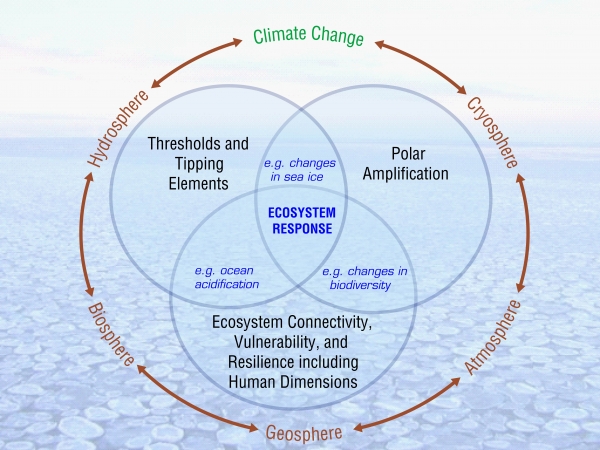In May 2011, the Polar Research Board (PRB) of the U.S. National Academy of Sciences issued a workshop report that identifies a set of frontier research questions intended to help scientists better understand the impacts of climate change on polar ecosystems. The report, Frontiers in Understanding Climate Change and Polar Ecosystems, illustrates many of the observable impacts of climate change already occurring in the polar regions and builds on this knowledge to highlight the major topics in polar ecosystem science to be addressed in the coming decades.
The PRB workshop was held in August 2010. It brought together scientists from academic institutions, federal agencies, and other organizations to identify and address frontiers in climate change and polar science. Speakers presented case studies and examples of recent changes in arctic and Antarctic marine and terrestrial ecosystems. Participants were asked to use this information and identify areas of research needed to advance scientific understanding of the rapid changes occurring in polar ecosystems. Participants considered the five interdisciplinary frontier questions that emerged from workshop discussions to be globally significant, relatively unexplored, challenging, urgent, and at the forefront of this expanding field of knowledge. The frontier questions are:
- Will a rapidly shrinking cryosphere tip polar ecosystems into new states? The loss of cryosphere is recognized as an important indicator of change in the polar regions and could have significant implications around the globe. Declining ice sheets and sea ice are critically important when considering (potentially irreversible) tipping points and thresholds that may alter ecosystems and push them into new states.
- What are the key polar ecosystem processes that will be the "first responders" to climate forcing? Understanding the linkages and interactions among components of polar ecosystems is crucial in the development of climate models that accurately predict future change. Perturbations to one part of the system can cause a cascade of impacts throughout the system.
- What are the bi-directional gateways and feedbacks between the polar and the global climate system? Complex connections and feedbacks in ecosystem processes require research and collaboration among many disciplines to improve scientific understanding of the bi-directional gateways of connectivity among ecosystem components in the global system. Examples of bi-directional gateways that need additional research include sea level rise, ocean circulation, the albedo effect, and biome shifts and migration patterns.
- How is climate change altering biodiversity in polar regions and what will be the regional and global impacts? Rapid changes in the polar regions associated with shifting climate patterns present serious complications for both marine and terrestrial organisms. Changes in productivity and migration could threaten biodiversity in ways that we do not yet understand.
- How will increases in human activities intensify ecosystem impacts in the polar regions? Increased access to the polar regions as a result of climate change will result in increased human activity (e.g., fishing, tourism, and resource extraction). Human presence in these regions can mean additional risk in the form of oil spills, invasive species, and disturbances to wildlife.

In addition to identifying the frontier questions, participants also considered various methods and technologies that will be useful to advance future research in polar ecosystem science. An effective approach to answering the questions includes a holistic, interdisciplinary systems understanding of ecosystem responses to change. Research needs include:
- Emerging technologies such as improvements in genomics, remote sensing, and in situ instrumentation;
- Sustained long-term observations including in situ observations, monitoring impacts on people, biological sentinels and proxies, biotic community composition, and a marine Long Term Ecological Research program (LTER) in the Arctic;
- Data synthesis and management such as international coordinated efforts and a Polar Systems Institute; and
- Data dissemination and outreach.
Workshop participants emphasized the importance of these key methods and noted that in many cases they represent enhancements to existing tools. Using developing technologies, observations, and data management systems to address the frontier questions, this report suggests a way forward in the coming decades at the intersection of polar ecosystems and global climate change.
The workshop report is available at: http://www.nap.edu/catalog.php?record_id=13132. To purchase paper copies, please contact the National Academies Press at: 888-624-8373.
The PRB is a unit within the National Academies and is responsible for studies related to the Arctic, Antarctic, and cold regions in general. More information about the PRB and other related activities can be found at: http://dels.nas.edu/prb/.
